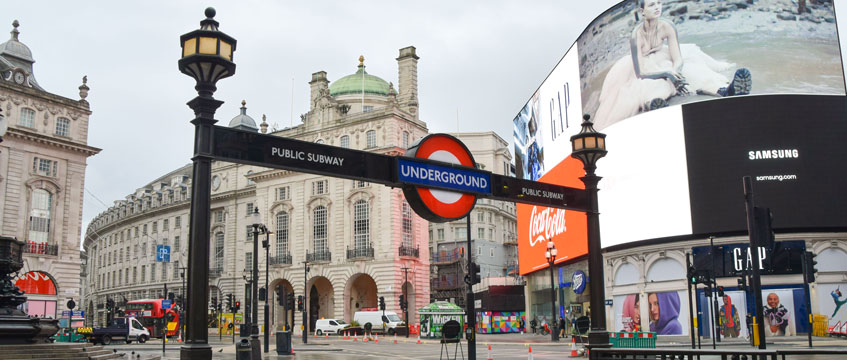London faces ‘cultural ruin without government lifeline’
Some of central London’s most influential bosses have warned the government that the culture sector faces “near extinction” as a result of repeated coronavirus lockdowns.
In a letter to culture secretary Oliver Dowden, chiefs at Shaftesbury, the Royal Academy and Madame Tussauds said measures including significant tax cuts and an extension to business rates relief are vital if the West End is to recover.
London’s theatres, arts institutions and entertainment venues are a major driver for international tourism in the capital, making up a significant portion of turnover for the West End’s retail and hospitality businesses.
Some of central London’s most influential bosses have warned the government that the culture sector faces “near extinction” as a result of repeated coronavirus lockdowns.
In a letter to culture secretary Oliver Dowden, chiefs at Shaftesbury, the Royal Academy and Madame Tussauds said measures including significant tax cuts and an extension to business rates relief are vital if the West End is to recover.
London’s theatres, arts institutions and entertainment venues are a major driver for international tourism in the capital, making up a significant portion of turnover for the West End’s retail and hospitality businesses.
Before the pandemic struck, cultural tourists spent around £7.3bn a year in the capital, they wrote in the letter organised by business group the Heart of London Business Alliance.
However, research by consultant Arup suggests that in a worst-case scenario the sector could face a 97% decrease in economic output over the next five years.
Signatories demanded a government-backed insurance scheme and grant funding for cultural institutions to enable them to reopen. They also called for an extension to the theatre tax relief scheme, business rates relief and to the VAT cut for arts, culture and hospitality businesses.
Ros Morgan, chief executive HoLBA, said the West End’s heavy skew towards hospitality and cultural venues meant it was “the first area to go into lockdown and the last to come out”.
“It is going to take a hell of a long time for the area to recover because it is so reliant on international tourists,” she added.
“The West End’s cultural offer is synonymous with the area itself. It is not just about getting people back into the West End, but also about whether there will be anything left for them to come back to.”
The letter was signed by UK Hospitality boss Kate Nicholls, Shaftesbury chief executive Brian Bickell, Royal Academy chief Axel Rüger, Madame Tussauds general manager Tim Walters, and London Property Alliance executive director Charles Begley, among others.
What they are calling for:
An extension of the Theatre Tax Relief Scheme and the definition of eligible core costs expanded to apply to all production expenditure and ordinary running activities;
A government-backed insurance scheme for theatre, arts and cultural institutions – similar to the one that has been given to film and TV;
An extension of the VAT cut for arts, cultural and hospitality businesses;
An extension of business rates relief until at least March 2022;
Grant funding to help make cultural venues Covid-19 secure and to enable their reopening;
Commitment to the publication of a roadmap out of lockdown with clear timelines for cultural organisations to plan towards.
EG understands that Dowden had not responded to the letter at the time of publication. A government spokesperson said: “We are supporting London’s culture through our unprecedented £1.57bn Culture Recovery Fund, which is helping to stabilise organisations and protect jobs across the city.
“So far over £300m has been given to cultural sites and venues in London such as the National Theatre and Shakespeare’s Globe as well as East End Women’s Museum and Matchstick Theatre in Lewisham.
“A safe return date for theatres, festivals and other large events will be agreed in due course, but right now the NHS is under extreme pressure and we must do everything we can to reduce that. Once we are confident we are in a position to explore possible reopening dates, we will be working with organisers to unlock the barriers they face to restarting.”
Why is the culture sector so important to the wider economy?
First and foremost, London’s theatres and cultural institutions are a major driver for international tourism in the capital, which topped 20m people a year before the pandemic.
Theatres in the capital hosted around 18,000 performances in 2019, bringing in 15m visitors and making more than £800m in revenue, according to data from the industry group Society of London Theatre.
Meanwhile, a combined 22.6m people passed through the doors of the British Museum, the National Gallery, the Tate Modern and the Natural History Museum that year, making up four of the 10 most-visited cultural institutions on the planet.
In the West End alone, the sector supports more than 80,000 jobs. Restaurants, bars and hotels all rely on the massive footfall boost provided by the sector to survive.
But the contribution that London’s arts and culture make to the wider economy is not just a numbers game: the capital’s prestigious standing as one of the world’s most desirable cities for inward investment is partly based on its cultural offering.
A £1.6bn government rescue package has so far limited some of the damage, but with little indication of when museums and theatres will be able to reopen – let alone begin to function normally again – businesses have called for a fresh round of support for the next financial year.
Speaking to EG last week, HoLBA’s Ros Morgan described the sector as a piece of “critical infrastructure” for London as a whole, adding that its predicament was “dire”.
“We need to invest in the culture sector right now and see it as a national asset. This is critical not just for the culture sector but for the wider business community and for the recovery,” she said.
To send feedback, e-mail alex.daniel@egi.co.uk or tweet @alexmdaniel or @estatesgazette
Pictures © Vuk Valcic/SOPA Images/Shutterstock; Philip Sharkey/TGS Photo/Shutterstock; James Veysey/Shutterstock











